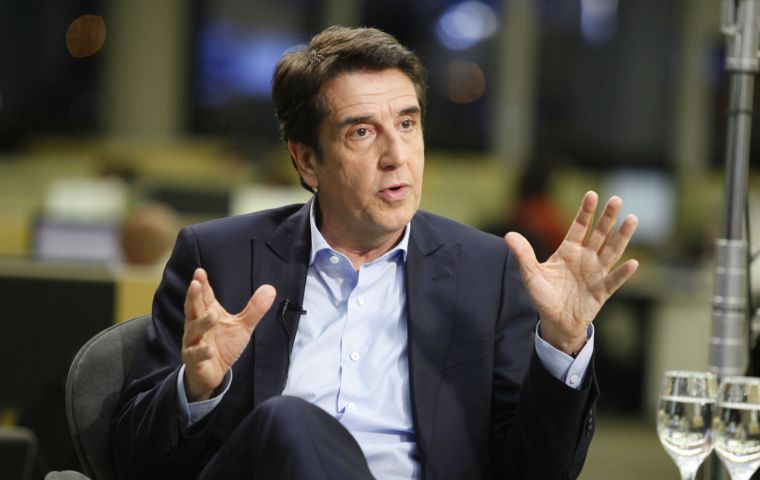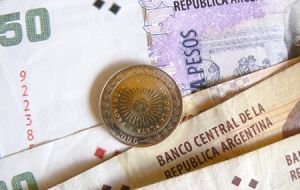MercoPress. South Atlantic News Agency
Argentina lowers interest rates for businesses as inflation tends to subside
 The decision follows the conviction that gradually “we will have a substantial improvement in the economy, with inflation trending lower,” said Melconian
The decision follows the conviction that gradually “we will have a substantial improvement in the economy, with inflation trending lower,” said Melconian  Inflation is expected at 39.6% for full-year 2016, according to a central bank poll of analysts. But that same poll showed a median forecast of 20% inflation in 2017
Inflation is expected at 39.6% for full-year 2016, according to a central bank poll of analysts. But that same poll showed a median forecast of 20% inflation in 2017 Argentina's main state-run bank said it lowered its headline interest rates for loans to businesses on Monday amid expectations that inflation will begin to slow in Latin America's third-largest economy, a move that will help put credit back within firms' reach. Banco Nacion, the country's largest financial institution and which also acts as a development bank, set its annual nominal reference rate for business loans at 27%, down from 32%.
The bank said it has also set aside US$330 million for loans to small- and medium-sized businesses at a discounted rate of 15%.
“We've made this decision with the conviction that gradually we will have a substantial improvement in the general economy, with inflation trending lower,” said Carlos Melconian, president of Banco Nacion.
Inflation in Argentina is expected at 39.6% for full-year 2016, according to a central bank poll of analysts. That has resulted in high interest rates on loans, making credit unaffordable for many companies. But that same poll showed a median forecast of 20% inflation in 2017, when the economy, currently mired in recession, is expected to return to growth.
The 10-month-old administration of President Mauricio Macri is applying orthodox economic policies following eight years of free-spending populism under the previous leader, Cristina Fernandez. Macri has eliminated currency controls and grains export taxes, lowered utility subsidies and settled a long-standing lawsuit with bond-holders that had kept the country in default. But the expected surge in investment has been slower to arrive than thought.
In related news the Argentine Central bank reported on Monday that reserves climbed US$ 3.792 million, the highest in three years and almost US$ 40bn. The jump follows the sale last week of 150.000 million Argentine Pesos in bonds purchasable in dollars, with an interest ranging 18% annually.
The last time the central bank international reserves were that high was in May 2013, but since then slipped continually despite a raft of measures to contain erosion.




Top Comments
Disclaimer & comment rules-

-

-

Read all commentsAnother small movement in the right direction for Argentina.
Oct 20th, 2016 - 05:32 pm +2I was in Buenos Aires last week for the first time in a while and I was impressed with the visible investment in new buses, new trains and infrastructure. The metrobus system is taking shape and improving traffic flows and making bus travel more attractive. The people were as warm and friendly as always and seemed relatively happy. Several people said they'd had plans to emigrate if the Ks had got in again. We were cautioned about using our phones in public but realised that nobody else seemed to have any concerns about this and everyone was using their phones on the street and the Subte etc. as they would anywhere else so I actually felt safe.
However, from what I saw outside BsAs, the rest of the country may well not have fared so well so it looks like Macri has been doing a good job in BsAs.
Article: “In related news the Argentine Central bank reported on Monday that reserves climbed US$ 3.792 million, the highest in three years and almost US$ 40bn. ..”
Oct 18th, 2016 - 05:03 pm +1Of course, this is shortly after some serious borrowing: a US$5 billion high-interest loan in January this year, and right after than another for US$16.5 billion (bond sale also at high interest rate) . That is how Argentina appears to have growing “reserves” in the central bank -- more than half of those dollars are the result of very recent high-interest loans while diminished real revenues are generating a large deficit.
Why do we need Enrique? Marti is starting to sound just like him!
Oct 18th, 2016 - 07:30 pm 0Commenting for this story is now closed.
If you have a Facebook account, become a fan and comment on our Facebook Page!